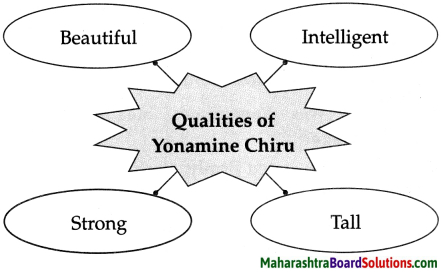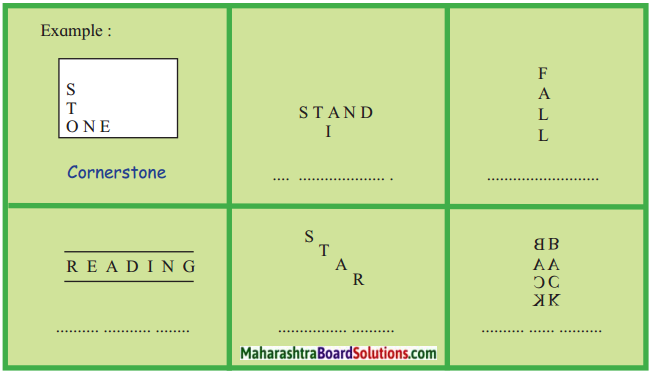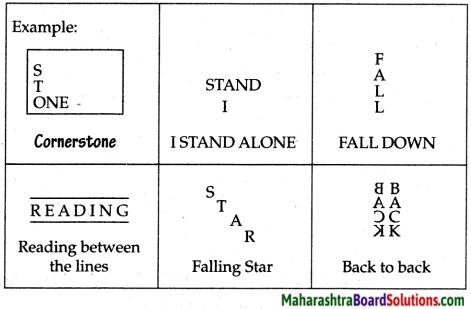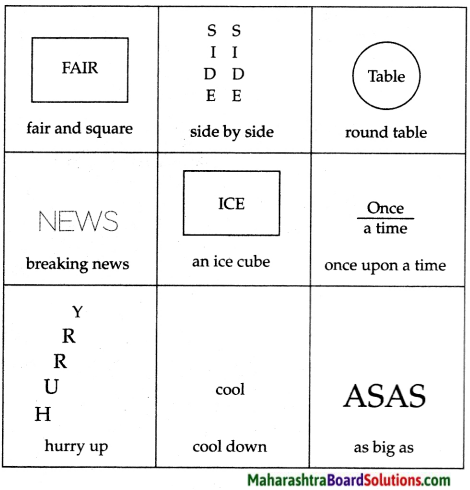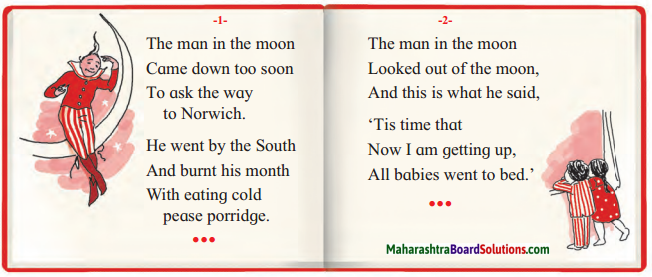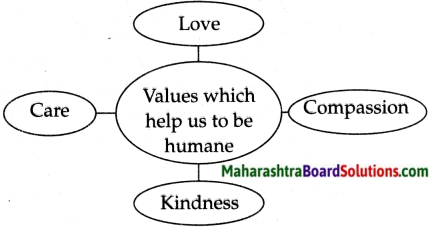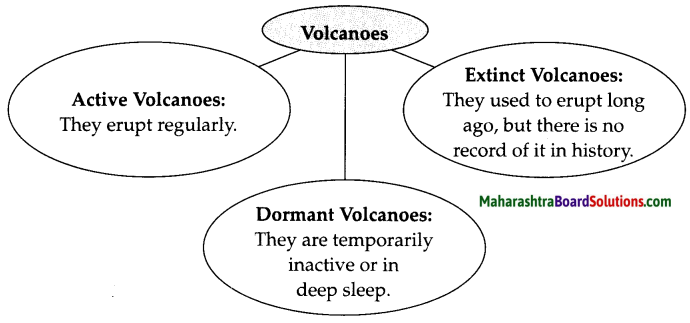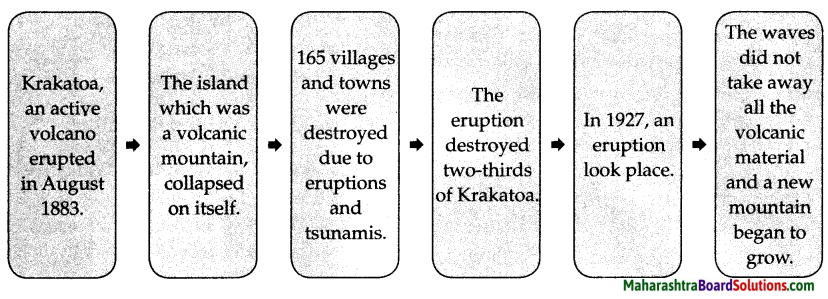Balbharti Maharashtra State Board Class 6 English Solutions Chapter 1.5 A Kabaddi Match Notes, Textbook Exercise Important Questions and Answers.
Std 6 English Lesson 1.5 A Kabaddi Match Question Answer Maharashtra Board
Class 6 English Chapter 1.5 A Kabaddi Match Textbook Questions and Answers
1. Form pairs. Make a list of as many games as you can. (At least 25) Then classify the games using the following criteria:
- indoor and outdoor games.
- Games played with and without any equipment.
- Games which have one-to-one matches and those in which teams play against each other (Single player or team)
- Games played mostly by children and games played by adult players.
- Shape and size of the court or field.
- Use the following figures to show your classification.

Question 1.
indoor and outdoor games.
Answer:
| Indoor Games |
Outdoor Games |
| Billiards |
Archery |
| Bowling |
Cricket |
| Boxing |
Diving |
| Chess |
Golf |
| Gymnastics |
Hockey |
| Judo |
Tennis |
| Karate |
Volleyball |
| Kung fu |
Kho-Kho |
| Squash |
|
| Swimming |
|
| Table tennis |
|
| Weight lifting |
|
| Wrestling |
|

Question 2.
Games played with and without any equipment.
Answer:
| Bowling |
Cricket |
Judo |
| Billiards |
Basketball |
Karate |
| Diving |
Table tennis |
Boxing |
| Squash |
Golf |
Weight lifting |
| Archery |
Chess |
Soccer |
| Boxing |
Hockey |
Kung fu |
| Badminton |
Wrestling |
Kho-Kho |
| Volleyball |
Gymnastics |
Swimming |
Question 3.
Games which have one-to-one matches and those in which teams play against each other (Single player or team)
Answer:
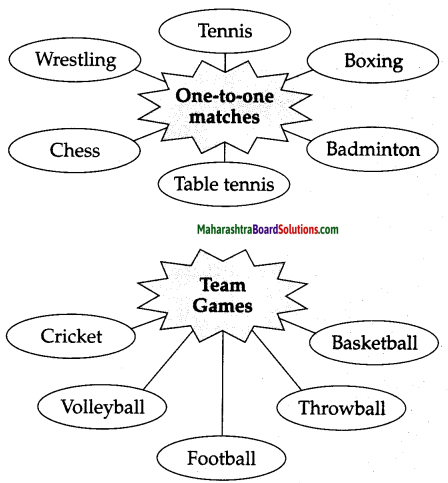

Question 4.
Games played mostly by children and games played by adult players.
Answer:
| Games played by children |
Games played by adults |
| Blind man’s buff |
Chess |
| Cops and robbers |
Snooker |
| Dodge ball |
Hockey |
| Four square |
Cricket |
| I spy |
Badminton |
| Leap frog |
Football |
| Pick-up-sticks |
Polo |
| Ring a Ring o’ Roses |
Billiards |

Question 5.
Shape and size of the court or field.
Answer:
| Name of the game |
Shape of the court field |
Size of the field |
| Basketball |
Rectangular |
26 m in length, 14 m in width measured from the inside edges of the boundary lines. |
| Boxing |
Square |
The ring should not be less than 12 feet or more than 20 feet square. The height from the ring floor level to the top rope should not be less than four feet, nor more than five feet. |
2. Read the description of the Kabaddi match and do the following:
Question a.
Note down the names of the players and say whether each one belongs to 9A or 9B.
Answer:
| Name of the student |
Class |
| Govind |
9A |
| Suresh |
9B |
| Ravi |
9B |
| Mohan |
9B |
| Vinod |
9B |
| Mangesh |
9A |
| Ajinkya |
9B |
| Mihir |
9B |
| Sohan |
9A |
| Vivek |
9A |

Question b.
Describe, in your own words, the important events in the first half.
Answer:
With the spectators clapping and boosting the morale of both the teams, the match got off to a good start. Having won the toss 9A sent their raider, Govind. Catching the opponent unawares, he touched Suresh from 9B and in no time headed towards home thus scoring a point.
Ravi being a strong player, with the knowledge of the right techniques appeared relaxed as he was aware of his strengths. Mangesh was wrestled down by Ravi and his friend, but Mangesh proved his capability. Even as he was on the ground with the anti¬raiders catching hold of his waist and legs, he slowly inched towards his court.
The best efforts of the anti-raiders failed in pulling him back and Mangesh successfully touched the mid-line scoring three points and getting three players of the anti-raiders out from the game.
Now, 9B began to play by exercising caution. Mihir and one of their raider tasted early success as they managed to tag Sohan in 9A. The other few raids were futile. Now, it was the turn of Vivek, the strategist. The remaining three players from 9B trapped Vivek. He slowly made his way back towards his court with the anti-raiders moving with him.
When they caught Vivek’s arm and tried to pull him back, Vivek slipped his leg beyond the midline with the anti-raiders still hanging onto his arm. Thanks to Vivek’s efforts, the whole of 9B was declared out.

Question c.
Write in your own words, what happened in the second half.
Answer:
The half time break was over, the star players of 9A were brimming with confidence. They did an encore by catching hold of ace raiders Mohan, Ajinkya and Ravi. As they say, the best team wins. Since 9A displayed excellence in all areas of the game, they emerged the winners. This coupled with team spirit, their confidence, strategies, swiftness and suppleness helped them emerge the winners beating 9B – a team which had never been defeated in any game of Kabaddi.
Question d.
Choose any one event and draw a diagram to show what happened.
3. List all the words specially used in the game of Kabaddi.
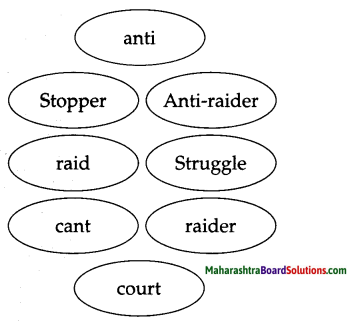
4. From the internet or other sources, find the other names by which Kubaddi is known in different parts of our country and the world.
Question 1.
From the internet or other sources, find the other names by which Kubaddi is known in different parts of our country and the world.

5. What characteristics are needed to be a good player of Kabaddi? What should you do to develop each? Discuss this in groups of 5 and write a composition on it.
Question 1.
What characteristics are needed to be a good player of Kabaddi? What should you do to develop each? Discuss this in groups of 5 and write a composition on it.
6. Read the following note from a school girl’s diary:

Write diary entries for the interesting or important events that take place in your school. Write at least 3 entries.
Question 1.
Write diary entries for the interesting or important events that take place in your school. Write at least 3 entries.
Answer:
Dairy 1.
15th June, 2016.
Dear Diary,
Today was the first day of our new academic year. It was a fun filled day meeting new teachers and friends.
I am looking forward to the days ahead. My friends and I have made several plans to make the most of our time in school. The new textbooks are really very informative and colourful.
I am all excited about the days ahead.
– XYZ
Dairy 2.
15th Aug, 2016.
Dear Diary,
We had a tree plantation drive in our school on the occasion of Independence Day. All of us had to take saplings to school. I had taken a mango sapling. I wonder when my sapling will grow into a huge tree. There were posters everywhere, one which said – “Plant and preserve, Plant and protect, Plant and prosper, Plant and perish”.
-XYZ
Dairy 3.
12th Dec, 2016.
Dear Diary,
Today was our Sports Day. It was inaugurated by our Sports Minister. After the speeches, the competitions started. Various competitions were held. The most exciting were the Tug of War and Relay. I won the gold medal in 100 m Running. What an eventful day it was!
-XYZ

7. Language Study: Degrees of comparison.
We use different forms of adjectives and adverbs to show comparison. They are known as degrees of comparison.
- Positive: Mangesh was ac strong ac Ravi.
She is as tall as her sister.
- Comparative: Mangesh was stroll gel’ than other players.
She is taller than her sister.
- Superlative: Mungesh was the strongest player in the team.
Their sister is the tallest amongst the three.
8. Complete the following sentences using your own ideas.
- The princess was as …………. as………… . (Positive)
- The princess was ……………. than …………….. .(Comparative)
- The princess was the ……………. amongst all ………… .(Superlative)
Note that we usually add ‘-er’, ‘-est’ to short adjectives and use more’ or ‘moSt’ with longer adjectives.
Examples:
- high – higher – highest
- attractive – more attractive – most attractive
- nice – nicer – nicest
- interesting – more interesting – most interesting
Question 1.
Complete the following sentences using your own ideas.
- The princess was as …………. as………… . (Positive)
- The princess was ……………. than …………….. .(Comparative)
- The princess was the ……………. amongst all ………… .(Superlative)
Answer:
- The princess was as beautiful as Princess lane.
- The princess was taller than Prince Arthur.
- The princess was the best among all girls.

9. Read the following words and name the degree of comparison shown by each.
good – better – best bad – worse – worst
Class 6 English Chapter 1.5 A Kabaddi Match Additional Important Questions and Answers
Answer the following in one or two sentences.
Question 1.
What led to the hopes of class 9 A soaring?
Answer:
The inclusion of three new students in class 9A, who were outstanding Kabaddi players led to the hopes of the class soaring.
Question 2.
How did the spectators boost the morale of both the teams?
Answer:
When the match started, all the spectators clapped and boosted the morale of both the teams.
Question 3.
How was the first point of the game scored?
Answer:
Raider Govind was so swift that before the opponents realised it, he had touched Suresh from 9B and was already heading home and a point was scored.

Question 4.
What was the strength of Ravi from 9B?
Answer:
Ravi from 9B, was a very strong player and he could single-handedly catch hold of any player tightly in between his legs, twisted like scissors. Releasing oneself from his grip would be next to impossible.
Question 5.
Why was Ravi relaxed?
Answer:
Ravi was relaxed as he had never dreamt of any strong opposition from any team.
Question 6.
Which quality helped Mangesh to prove his mettle?
Answer:
The quality of determination helped Mangesh . to prove his mettle.
Question 7.
What was the result of Mangesh’s efforts?
Answer:
Mangesh, through his efforts not only saved himself but was able to score three points for his team as Ravi, Mohan and Ajinkya who were holding him were also declared out.

Question 8.
How was the whole of 9B team declared out?
Answer:
The three players from 9B trapped Vivek but he slowly moved back towards his court with the three anti-raiders moving with him. When they caught his arm and were trying to pull him back, Vivek slipped his leg beyond the midline with the anti-raiders still hanging on to his arm. Thus, the whole of 9B team was declared out.
Question 9.
What helped 9 A beat 9B who had never tasted defeat earlier in the game of Kabaddi?
Answer:
9A outplayed 9B in all areas of Kabaddi. Their team spirit, confidence, strategies, swiftness and suppleness helped them to beat 9B who had never tasted defeat before.
Reading Skill, Vocabulary and Grammar
Read the following passage and complete the activities that follow.
Question 1.
Prepare a word register for the word ‘sports’.
Answer:
courts, teams, opponents, players Extract:
In Kabaddi, two teams of seven members each, face each other on a flat rectangular court, divided by a midline. The game is usually played in two halves with a halftime break in between. After the break, the teams exchange their sides on the court.
To play the game, each team sends ‘raiders’ across the midline to the other team. The raider tries to ‘tag’ the opponents and run back to his side, all in one breath. To show that he hasn’t inhaled again, he has to chant ‘Kabaddi-Kabaddi’ all the time. If he has to inhale again, he is ‘out’.
The opponents try to catch the raider and stop him from going back to his half till he loses his breath, and has to inhale again. If the raider manages to go back successfully, all the persons he has tagged and all those who have touched him are declared out. For each player declared out, the opposite team scores a point. If all the seven players in a team are ‘out’, the opposite team gets bonus points – a Iona. The team with the maximum points wins the match.
The game of Kabaddi requires good health, muscular strength, strategic skills, a lot of practice and above all, great determination.

Question 2.
Which aspects of the game of Kabaddi is highlighted in this extract?
Answer:
The rules of the game of Kabaddi and the qualities required to excel in this game are title two aspects discussed in this extract.
Question 3.
What should each team do to play the game?
Answer:
To play the game, each team sends ‘raiders’ across the midline to the other team.
Question 4.
What does the raider do?
Answer:
The raider tries to ‘tag’ the opponents and run back to his side, all in one breath.
Question 5.
Why should the raider chant ‘Kabaddi- Kabaddi’ all the time?
Answer:
To show that the raider has not inhaled again, the raider has to chant ‘Kabaddi-Kabaddi’ all the time.
Question 6.
When does the opposite team get bonus points?
Answer:
When all the seven players in a team are ‘out’, the opposite team gets bonus points – a Iona.

Question 7.
Which team wins the match?
Answer:
The team with the maximum points wins the match.
Question 8.
What are the qualities essential to excel at Kabaddi?
Answer:
To excel in the game of Kabaddi one requires good health, muscular strength, strategic skills, a lot of practice and above all, great determination.
Question 9.
The team with the maximum points wins, the match. (State the word class of the underlined word.)
Answer:
maximum – adjective
Question 10.
Do you think sports plays an important role in development? Elaborate.
Answer:
Mahatma Gandhi, has rightly said: “Education is the all-round development of an individual – body, mind and spirit.”
Sports plays an important role in contributing to our physical fitness apart from developing essential values and virtues.

Language Study
Do as directed.
Question 1.
The school sports meet was scheduled next month. (State the part of speech of the underlined word.)
Answer:
next – adjective
Question 2.
The practice matches had already begun. (Add a question tag.)
Answer:
The practice matches had already begun, hadn’t they?
Question 3.
When the match started, all the spectators clapped and boosted the morale of both the teams. (Pick out the action words.)
Answer:
started, clapped, boosted
Question 4.
9A won the toss and sent their raider Govind. (Begin the sentence with, “Winning the toss ……”)
Answer:
Winning the toss, 9A sent their raider Govind.
Question 5.
All the players were literally afraid of him. (Pick out the adverb.)
Answer:
Adverb: literally

Question 6.
Mangesh from 9A was strong. (Form a Wh- question to get the underline word as the answer.)
Answer:
Who was strong?
Question 7.
Kabaddi is an ancient sport. (Pick out the article.)
Answer:
an – article
Question 8.
The team with the maximum points wins the match. (Pick out the collective noun.)
Answer:
team – collective noun
Question 9.
Indian girls and boys have always excelled at Kabaddi. (Pick out the naming words.)
Answer:
girls, boys, Kabaddi – Naming words

Question 10.
One day, you may help win glory for your school. (Pick out the modal and state its function.)
Answer:
may – possibility
Change into the positive degree of comparison.
Question 1.
Kabaddi is the most popular game in this school.
Answer:
No other game is as popular as Kabaddi in this school.
Question 2.
Kevin was the strongest player.
Answer:
No other player was as strong as Kevin.
Question 3.
Kabaddi is more popular than that game.
Answer:
This game is not as popular as Kabaddi.

Question 4.
He is the best Kabaddi player in the school.
Answer:
No other Kabaddi player in the school is as good as he is.
Name of Kabaddi in different parts of the world.
- baibalea – Maldives
- hadudu – Bangladesh
- kabaddi – Denmark
- kabaddi – Kenya
- kabaddi – Spain
Complete the table.
| Noun |
Adjective |
Verb |
| practice |
practical |
practise |
| strength |
strong |
strengthen |
| inclusion |
inclusive |
include |
| declaration |
declarative |
declare |
| strategy |
strategic |
strategies |

Writing Skills
Flow Chart:
Question 1.
Arrange the points in proper order to show how the game of Kabaddi is played. Write the numbers in the blocks.
Answer:
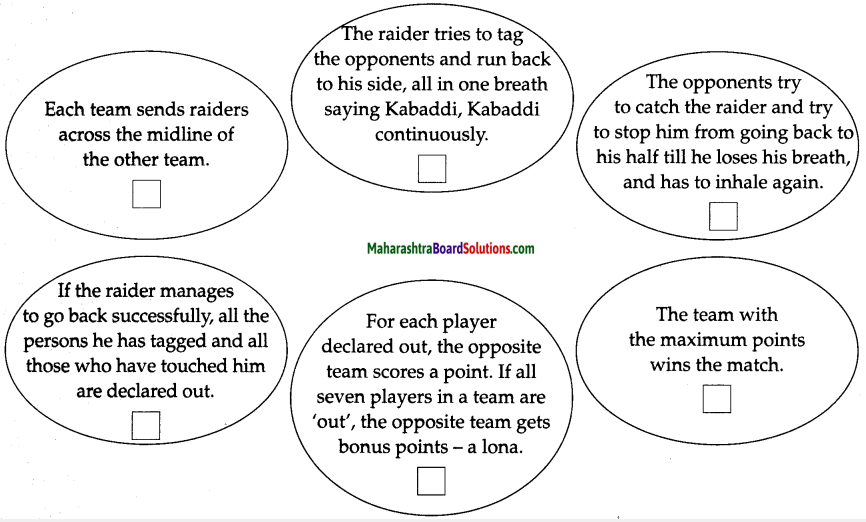
Essay:
Question 1.
Write an essay using the points given below.
What characteristics are needed to be a good player of Kabaddi?
What should we do to develop each of them?
Answer:
A Good Kabaddi Player
Any player requires various characteristics to emerge as a good player. The game of Kabaddi too requires physical and mental fitness. While good health, muscular strength and strategic skills are essential to emerge a winner, also equally important are other traits. Determination, dedication, devotion, consistency in performance and willingness to give one’s best, too are of paramount importance.
We can acquire these skills if we resolve to do our best and give our hundred percent to the game. Right skills, ample practice and the will to excel will help us reach our goal. Watching Kabaddi matches on television, seeking help from experts, finding one’s weak areas and working on them are ways in which we can develop attributes to become a good Kabaddi player.
‘Hardwork is the key to success’ in Kabaddi or any other game.

Let Us Remember:
“The heights which great men,
Reached and kept,
Were not attained by sudden flight,
They, while their companions slept, were toiling upwards in the night.”
Do yoy know?
Kabddi World Cup
The 2016 World Cup, the third standard style Kabbadi World Cup was an international Kabbadi tournament contested from 7th October 2016 to 22nd October 2016 at the Arena, in Ahmedabad. 12 countries had competed in the tournament and 33 matches been played. The tournament was won by India who defeated Iran 38-29 in the Championship Games to win their third Kabbadi world cup.
Kabaddi Match Summary in English
The lesson begins with a School Sports Meet through which the rules and strategies of the game are shared with the reader. The extract also highlights the qualities displayed by the winning team – team spirit, confidence, right strategies, swiftness and suppleness.
The lesson goes on to talk about the rules of the game and ends with qualities essential to excel in this game.
Introduction:
This lesson is about Kabaddi, an outdoor sport which originated in India, and is now popular in many countries of the world.

Glossary:
- sports meet (n) – an event where sports competitions are held
- scheduled (v) – planned
- outstanding (adj) – very good
- pectators (n) – people who watch a game
- opponents (n) – ones who compete with another in a game
- grip (n) – a firm hold
- literally (adv) – exactly
- anti-raiders (n) – every player in whose court, raid is being made
- determination (n) – firmness in purpose
- cautiously (adv) – in a guarded manner
- strategies (n) – plans of action to achieve an aim
- enviable (adj) – sought after
- ace (adj) – one who excels
- swiftness (n) – moving with rapid speed
- suppleness (n) – flexibility
- inhale (v) – breathe in
- tagged (v) – to follow someone from one place to another
- strategic (adj) – useful in achieving a plan
- resolve (n) – firm decision
6th Std English Questions And Answers:
![]()
![]()
![]()
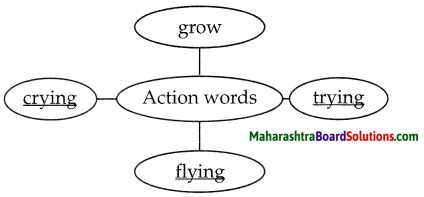
![]()
![]()
![]()

